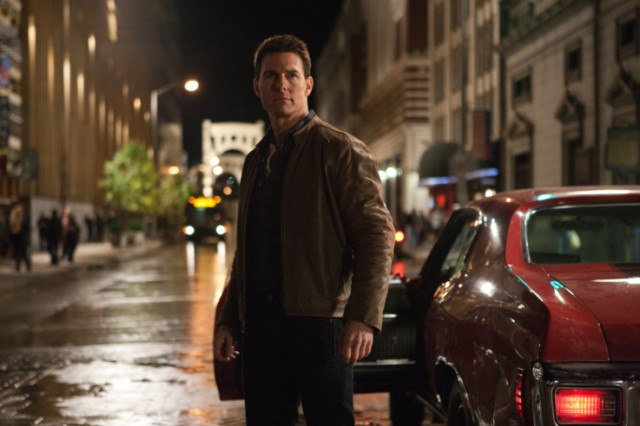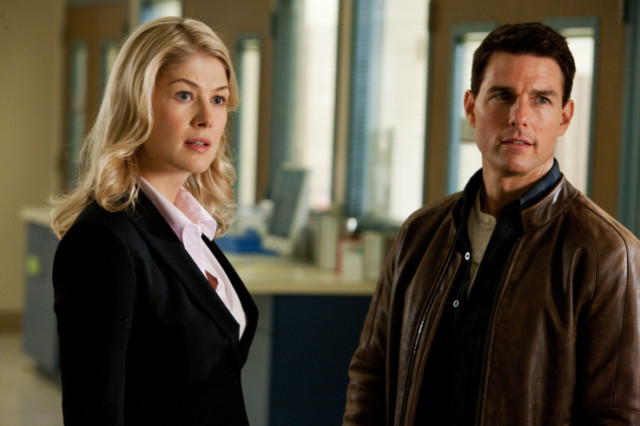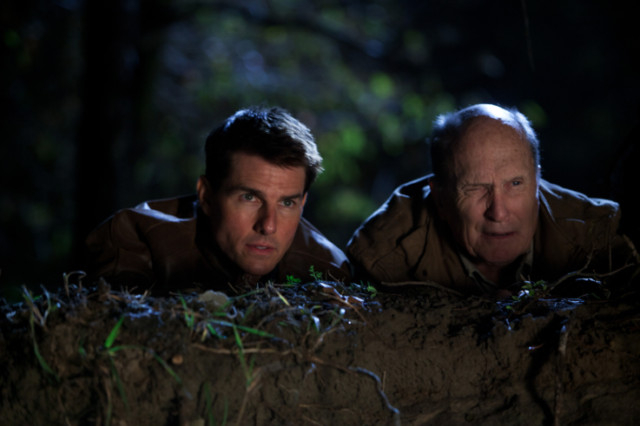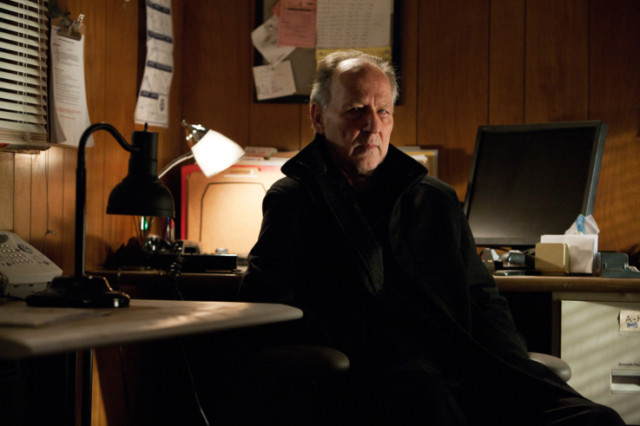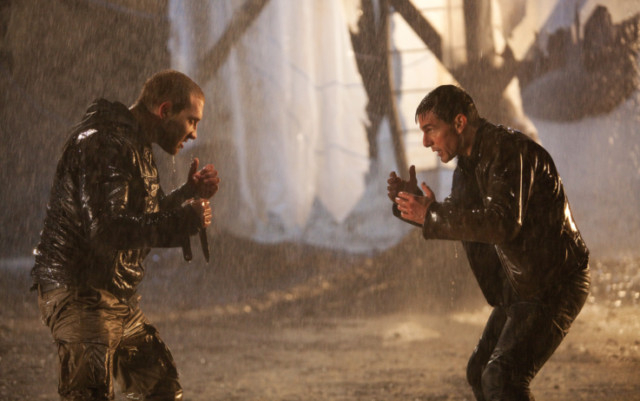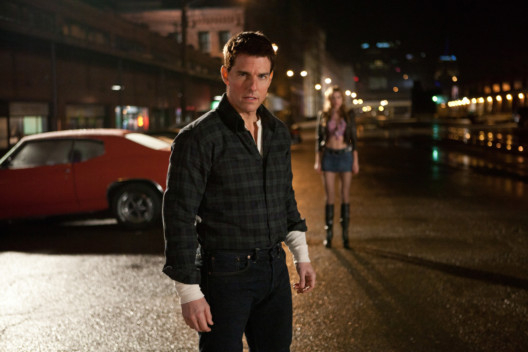
Jack Reacher, the hero of Lee Child’s wildly popular thriller novels who is finally coming to the big screen on December 20, fails to pass any number of smell tests, some quite literal.
He’s a voluntarily homeless drifter who travels the hot and dusty highways of America wearing the same set of clothes for several days at a time - he carries no luggage, no ID, nothing at all but a toothbrush and an ATM card, occasionally replacing his clothes with brand-new ones, bought cheap — but no one in any of the 17 Reacher books to date has ever hinted at anything remotely resembling body odour.
It’s tempting to say that this is because no would dare. Reacher is intimidatingly large — 250 pounds of solid muscle, a human tank - but, in fact, he’s always running into people who aren’t overly concerned about sparing his feelings. In his most recent outing, ‘A Wanted Man’, someone calls him “a gorilla with its face smashed in.” Not that he minds - sticks and stones and all that; even bullets are barely more than nuisances.
In the series’ third installment, 1999’s ‘Tripwire’, a round fired at close range from a .38 revolver fails to penetrate Reacher’s chest, stopped by his massive pecs. No, really.
The unlikelihoods and outright impossibilities stack up. Ever a frugal sort, Reacher travels mostly by hitchhiking (as he does at the beginning of ‘A Wanted Man’ and 2001’s ‘Echo Burning’, both set roughly in the time they were written), even though the practice is roughly as current as bellbottoms and even though his appearance is, as previously established, notably simian. (Not that this deters a series of smart, attractive young women, most of them officers of the law, from jumping into bed with him.) And although he’s a loner who seems never so happy - rather like Agent Cooper in ‘Twin Peaks’ - as when sitting quietly in a diner with a cup of black coffee and a piece of pie, he has an uncanny knack for stumbling into the worst kinds of trouble, almost none of it connected to himself, at least at first. One minute he’s minding his own business, walking down a back street in some small town, or napping in the back of a Greyhound bus on the way to some bigger town, and the next minute - as Donald Rumsfeld once said about events in Baghdad - stuff happens. And before you know it, Reacher is caught up in some outlandish spiral of mayhem and murder, always involving an innocent victim and a complex criminal scheme masterminded by vicious men (or sometimes women) and culminating, typically, in an assault by Reacher on their heavily fortified lair.
The odds for his survival are never good, but he beats them every time. At the end of 2010’s ‘61 Hours’, for example, Reacher is inside a storage bunker in South Dakota, hundreds of feet below the ground, when it explodes. But in ‘Worth Dying For’, published later the same year, there he is again, tangling with a new set of villains in Nebraska, not much worse for wear. Fortunately, Reacher is well-prepared for such niggling challenges. He was a military police officer in the Army, downsized during the Clinton-era “peace dividend” period - though there was more to it than that, as we learned in last year’s out-of-sequence ‘The Affair’ — and he has all sorts of special training.
He’s a marksman of sniper-level skills, as he demonstrates in ‘Die Trying’ (1998), and knows the history, operational details and relative merits of every sort of handgun and rifle known to man. Not that he relies on such weapons, or even prefers them; he has a PhD in the science of hand-to-hand combat, often delivering surgical blows to select parts of his adversaries’ anatomy at just the right velocity and force. (He head-butts with precision and uses his elbows to particularly devastating effect.) He never starts a fight, but once it’s started, he never fails to end it. Open that door, he warns would-be assailants in several variations, and don’t surprised by what pops out at you. Of course they never listen. They learn, eventually, but they do it the hard way. None of this, of course, helps us readers suspend our disbelief. Then again, we don’t need help; what we need is more Reacher books. The most commonly uttered cliche among fans of the series is that the only thing wrong with a Lee Child novel - which we typically polish off over a single weekend or less - is that it ends too soon, always with Reacher slipping off down yet another lonely highway, mission accomplished.
How is it, uninitiated readers may ask, that a thriller series with such a brazenly ludicrous premise has become so popular? Can it really be that its installments routinely land at No. 1 on the bestseller lists and that they’re the basis for the next big action-movie franchise, with no less than Cruise in the title role? What can possibly account for the fascination of these books, with their generic titles, predictable story elements, forgettable villains and highly memorable but transparently phony hero, a literary contrivance with no more connection to reality than, say, Frodo Baggins?
First of all, Frodo seemed awfully real to generations of passionate readers long before he had his own big-screen adventure a few years ago. Second, “phony” is a fighting word, and besides, it misses the point. In fiction of this sort, in which preposterous things are always happening, reality is not established by what the author says it is. It’s established by how he says it - which is to say, by his tone. Tolkien was a master of tone. So, it turns out, is Child, who has hypnotised millions of readers with the confidence - some might say the sheer chutzpah - of his character’s voice.
Jack Reacher is, in fact, a contrivance, the wholly imagined creation of a British TV director named Jim Grant _ “Lee Child” is a pseudonym - who was himself downsized in the mid-1990s and needed to make a living. As he has explained over the years in various interviews, his concept of Reacher as a modern-day knight-errant wandering the country righting wrongs, with few if any personal connections or possessions to slow him down, was formed in reaction to the more typical “soap opera” mode, featuring a more-or-less stationary hero perennially embroiled with a cast of supporting characters (sidekicks, significant others, children and the like).
But to lend credibility to the highly unusual figure of Jack Reacher, whose mode of living would be completely unrelatable to most readers, Child had to establish a voice for the character that was immediately convincing and arresting. And so it happened. Consider the first words of the first Reacher novel, 1997’s ‘Killing Floor’: “I was arrested in Eno’s Diner. At twelve o’clock. I was eating eggs and drinking coffee. A late breakfast, not lunch. I was wet and tired after a long walk in heavy rain. All the way from the highway to the edge of town.”
The first thing you notice is the staccato rhythm. Short sentences, every other one a fragment. It’s blunt, almost brutal, but there’s a chunky, thumping music, even more spartan than Hemingway’s. Note, too, the paucity of modifiers and the strict simplicity of punctuation. In all the Reacher novels, there’s rarely a dash, almost never a semicolon; even commas are scarce. This is the voice of a man who has stripped away everything from his mind and speech that isn’t strictly necessary. His language is ostensibly, almost ostentatiously, for conveying facts. But with every word, he’s telling you not just what’s happening but who he is: someone with no time for anything but the bare essentials. Someone with absolute clarity about the world and his place in it. Someone, therefore, not to be messed with. And so it goes, for 17 books and many thousands of pages.
The voice is perfectly suited to every aspect of Reacher’s character, including the fact that he’s preternaturally watchful. Every time he enters a room, he always sits with his back to the wall so that he can’t be approached from behind. He scans every crowd he’s in, looking at clothing, faces, body language. Like a human supercomputer, he constantly analyses all that data, looking for threats or people in distress. ‘Gone Tomorrow’ (2009) begins with Reacher on the New York subway, noticing a woman exhibiting a checklist of signs that she’s a suicide bomber. He turns out not to be exactly right - like his forefather Sherlock Holmes, whom he resembles in certain respects, he’s not infallible - but close enough. And so we gladly follow him - Jack Reacher, this laconic, brilliant, spectacularly violent man - no matter how dubious or downright absurd his adventures might seem. We’ve learned the hard way.
*’Jack Reacher’ starring Tom Cruise opens in the UAE on December 20.


